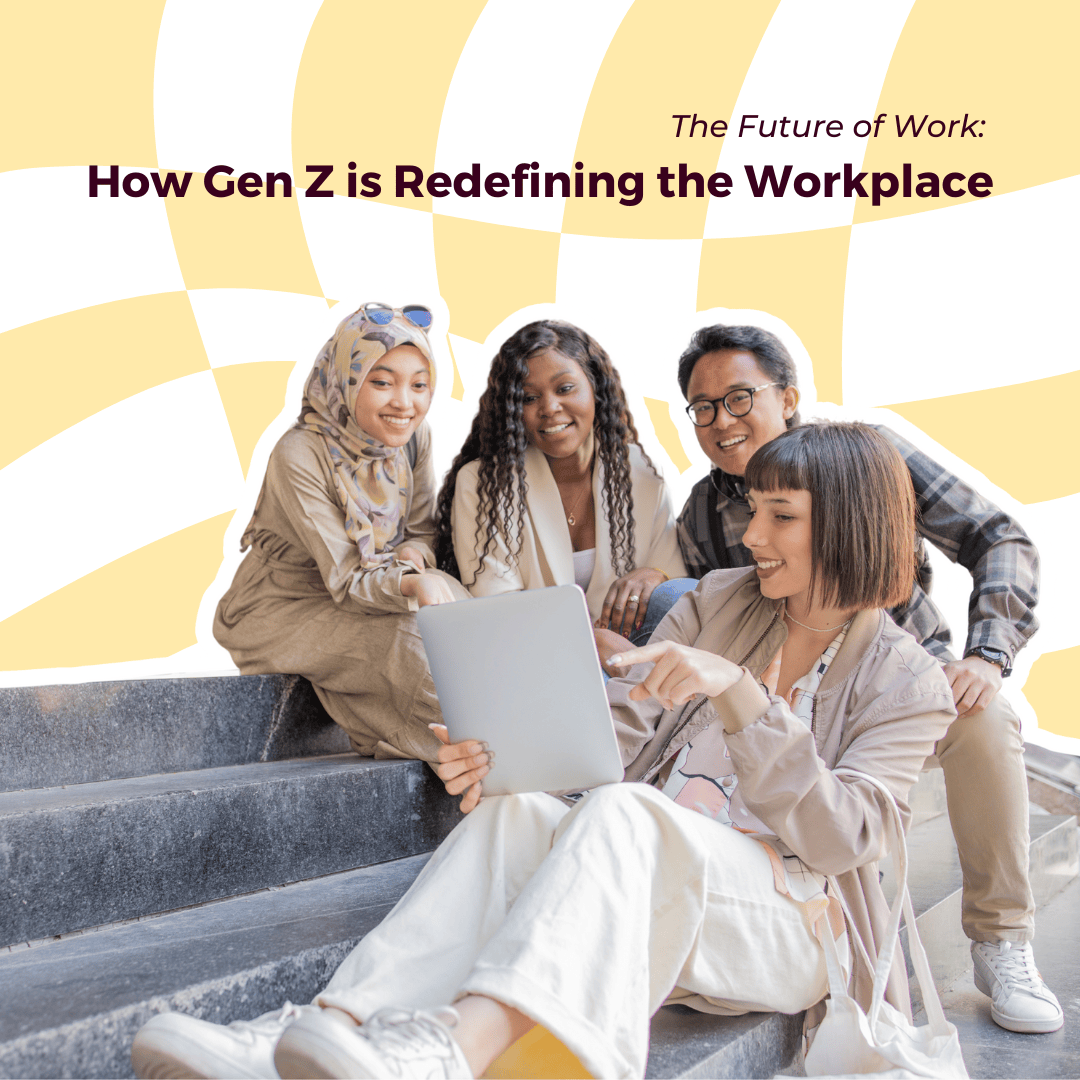CATEGORIES
#Careers #Gen Z #Work CultureOverview:
- Gen Z is transforming workplaces, pushing businesses to adapt to their new expectations and values.
- Gen Z is redefining work with their focus on technology, flexibility, diversity, sustainability, and mental health.
- Embracing Gen Z requires fostering inclusion, leveraging technology, and promoting work-life balance in the workplace.
- To stay ahead, companies must innovate and meet Gen Z’s expectations for the future of work.
The workplace has been changing very quickly due to the coming of Generation Z, who were born between 1997 and 2012. As they were growing up, they were so close to the internet and social media that made them tech-savvy, inclusive, and socially conscious. Their specific wants regarding the work environment and values they have are the ones that are pushing the businesses to engage with and operate
Gen Z’s companies inclusion of the employees into the decision-making process, which mentions embracing technology, promoting flexibility, and focusing on the purpose-driven work are suggested to meet the desires of Gen Z. Businesses are obliged to ideate strategy to meet the demanding future. Representation of Workplace Cultural integration bridges the engagement gap that occurs when the multi-generation workforce meets the challenges of the new workplaces. With the support of the tech-savvy Gen-Z workforce, companies such as Fan Suisse are taking the lead in sustainability through innovative practices and cross-system collaboration in their business operations.
Who is Gen Z?
Gen Z refers to individuals born between 1997 and 2012, and represents the first fully digital generation, offering a fresh and unique perspective to today’s workplace. Known for their strong sense of purpose, social responsibility, and a desire for authenticity, Gen Z values meaningful contributions. Their quick adaptability to new technologies and trends makes them dynamic and capable employees in the fast-evolving work environment.
How Gen Z is Redefining the Workplace
As Gen Z enters the workforce, they are changing long-held workplace norms. Their preferences for remote work, diversity, and mental health awareness, alongside their demand for transparency, challenge traditional business models.
Many people give utmost importance to flexibility. They find employers who have the possibility to become remote or hybrid, and who also give an important to the work-life balance.
Gen Z is shifting the workplace from hierarchical, rigid structures to collaborative, inclusive, and tech-driven spaces where innovation thrives.

Key Traits of Gen Z Employees
The characteristics of Gen Z workers are essential to understanding their influence on the workplace. These traits include
Tech Proficiency:
We are referring to tech proficiency wherein technology usage and technological innovation among Gen Z are growing. They are the ones who have evolved in the era of the internet, smartphones, and social media. They expect that employers will utilize the power of digital communication, collaboration, and innovation for their work.
Desire for Flexibility:
Flexibility in terms of mobile work is a prominent area where Generation Z differs from past cohorts such as Baby Boomers and Gen Xers. Gen Z would love to undertake the same level of flexibility that will allow them to work from home, choose their own hours, and look after their work-life balance themselves.
Focus on Diversity and Inclusion:
Diversity and inclusion at the workplace are not negotiable for Gen Z. They espouse diversity and look forward to inclusive environments where everyone has the opportunity to participate, contribute, and grow. They are demanding that organizations they work for allow a diverse leadership, have equal staff policies and measures, and be a respectful and inclusive environment.
Purpose-Driven Mindset:
For Gen Z, the topic of work extends beyond the issue of remuneration. They are looking to find organizations whose values and mission align well with their own, especially those that make social responsibility and environmental sustainability a priority.
Mental Health Awareness:
One of the main issues stressed by Gen Z is mental health. They prioritize mental health, seeking help by getting involved in wellness programs, taking days off for their mental health, and also engaging in open discussions about mental health and well-being within the workplace.
Why Flexibility Matters to Gen Z
Flexibility is a top priority for Gen Z workers. The intention is that remote working and the use of flexible schedules bring about more work productivity and a healthier work-life balance.
Young people today desire independence and would prefer that supervisors not ‘breathe down their necks,’ but focus on results rather than the traditional management approach. Delivery of flexibility is not only about remote work but also includes employees who work in the way they feel is most effective. Gen Z talent will be more willing to join and stay in companies that offer the right amount of flexibility.

The Impact of Technology on Gen Z’s Work Style
Technology plays a pivotal role in Gen Z’s approach to work. They expect businesses to embrace advanced tools, from communication platforms to project management systems, to facilitate seamless collaboration. As digital natives, Gen Z is adept at using video conferencing, team messaging apps, and cloud-based software. However, they also expect employers to stay ahead of tech trends and innovations, providing them with the tools necessary for success.
The Importance of Mental Health in the Workplace
For Gen Z, mental health seems a very important matter nowadays, and it is considered a fundamental part of their work life. Gen Z-er’s are demanding the name of the game. They expect companies to take seriously the mental health of their employees by giving them support, centers for mental health, time off when needed, etc. By offering mental health days, access to therapy, and developing a culture that is well-being-oriented are the best practices that companies can use to hire and keep Gen Z employees
Adapting one’s Business to Gen Z
To attract and retain Gen Z employees, businesses need to make specific adaptations. Some key changes include:
- Being honest and opening up with everyone is a very important thing. Gen Z is characterized by honesty and they expect their leaders to be transparent and tell them about the company’s goals and decisions.
- One way to do this is through the promotion of inclusivity and diversity by hiring fairly and making sure that all voices are equally recognized.
- Going green and taking social responsibility will help you meet the demands of Gen Z.
- Using technology to bring about processes that are more effective and collaborative.
- Assistance with mental health resources and support will be made available.
Tips for Managing Gen Z Employees
Working with Gen Z has changed everything in the way the workplace is done as opposed to those who came before them and so it has necessitated a different strategy for managing them. Here are some tips for effective management:
Offer Flexibility:
Discuss different kinds of flexible work arrangements like remote work and compressed and flexible schedules.
Foster a Collaborative Environment:
Promote an environment of alliance especially in the workplace and at home. Gen Z prefers to work in an environment where they can be with others as they work.
Prioritize Professional Development:
Facilitate opportunities for skill-building, career development, and upskilling. Gen Z wants to keep on innovating their skills and secure their future.
Be Authentic:
Authenticity matters to Gen Z. Lead with integrity and build genuine relationships with your team members.

Girl Power Talk’s Approach to the Future of Work
Girl Power Talk acknowledges the difficulties of the transition to Gen Z’s workplace outlook that various businesses experience. Our professionals collaborate with enterprises in initiating novel digital systems, cherishing variety, and customizing mobile workspace applications. By concentrating on promoting mental health, and social responsibility, and utilizing the latest developments in technology, we are helping businesses to break away from the old and remain competitive in the fast-moving field of work.
Conclusion:
GenZ is reshaping the future of work by challenging the traditional workspace norms and expectations. Companies that adopt flexibility, leverage technology, support mental health, and promote inclusivity will have leverage in attracting and retaining GenZ talent. Understanding and adapting to this generation’s preferences is crucial for businesses. By doing so, they can create a thriving work environment that encourages innovation, well-being, and long-term success.


